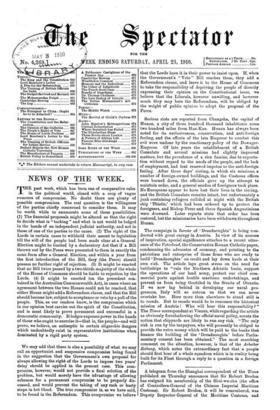NEWS OF THE WEEK.
THE past week, which has been one of comparative calm in the political world, closed with a crop of vague rumours of compromise. No doubt there are plenty of possible compromises. The real question is the willingness of the parties chiefly concerned to consider them. It may be worth while to enumerate some of these possibilities. (1) The financial proposals might be altered so that the right to decide what is " tacking " and what is not would be lodged in the hands of an independent judicial authority, and not in those of one of the parties to the cause. (2) The right of the Lords in certain cases to withhold their assent to legislation till the will of the people had been made clear at a General Election might be limited by a declaratory Act that if a Bill thrown out by the Peers were presented to them in exactly the same form after a General Election, and within a year from the first introduction of the Bill, they (the Peers) should possess no further right of rejection. (3) It might be enacted that no Bill twice passed by a two-thirds majority of the whole of the House of Commons should be liable to rejection by the Lords. (4) It might be enacted (on the precedent con- tained in the Australian Commonwealth Act), in cases where an agreement between the two Houses could not be reached, that either House might add a Referendum clause, and that the Bill should become law, subject to acceptance or veto by a poll of the people. This, as our readers know, is the compromise which in our opinion best carries out the spirit of the Constitution, and is most likely to prove permanent and successful in a democratic community. It lodges supreme power in the hands of those who ought to exercise it—that is, the people—and will prove, we believe, an antiseptic to certain oligarchic dangers which undoubtedly exist in representative institutions when dominated by a rigid party system.














































